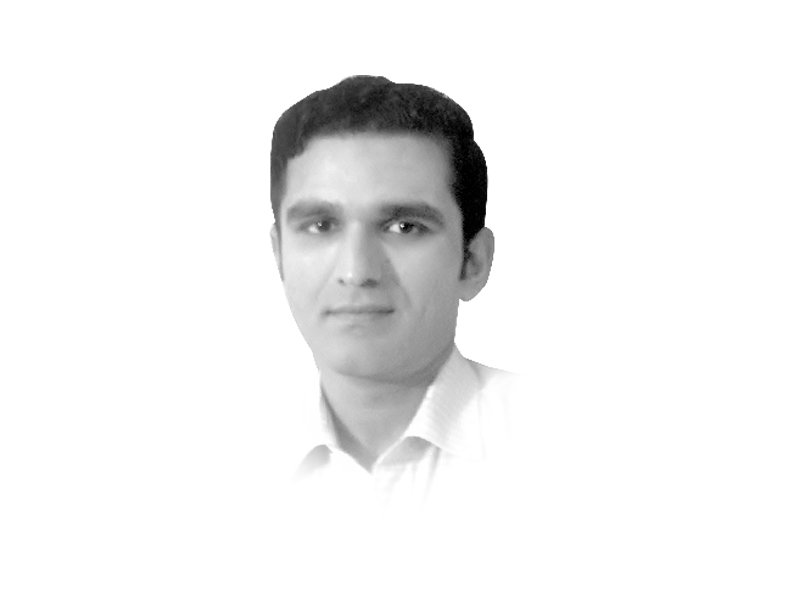
A lot of people have commented on the brutality and the senselessness of the Quetta killings and I have seen people being jolted by the scenes of men, women and children sitting by the side of decomposing bodies of their loved ones in extreme cold and rain. These visions shook a number of people and a large number protested against such inhuman killings. However, what I also noticed was the fact that after such protests, which were important, almost everyone just went away as if nothing had happened. For the upper middle class, for example, the daily routine of coffee, lunches and dinners continued after these protests. For the working class, understandably, life is too tough and hard in any case to care much about someone else’s misery. But it is as if a lot happened, but nothing changed.
As the events in Quetta unfolded, I noticed the reaction of students at the university I teach. Since a large number of students at the Forman Christian College come from Balochistan, I expected some reaction, some discussion in classes — something to show that it was not business as usual. However, except for some murmurings from some students, the general atmosphere remained unchanged. When I asked around for something beyond simple protests, people had no idea what to do or say, and this made me think: we, the common people in Pakistan, cannot do anything to prevent acts of terrorism or solve the larger issues of Pakistan, but what we can do is to begin the process by changing ourselves a bit and doing something for our immediate surroundings. Let me explain what I mean.
Pakistan is increasingly becoming a country of extremes. Either X is good or X is evil, either the decisions of the judiciary are good or they are bad, either fix the ‘system’ in 90 days or we will not accept anything else, either everyone pays tax or no one pays tax, and the list goes on. Quite obviously, neither a country, nor a person’s life, can be run only on extremes. Pakistan has also become a country where we always look at the other person. So, X does not give taxes and so I won’t either; Y is a crook and so I can be one, too, etc. This definition by the ‘other’ is actually rather emblematic of our national predicament. Since Pakistan was largely defined as ‘not-India’, a national identity and discourse sans the ‘other’ (i.e., India) has never really developed. And this has permeated the population. We never self-define ourselves and always look at the ‘other’ first and then react.
So, let me posit a rather obvious, but seldom discussed theory: why not look at ourselves and change ourselves first? Why don’t I start paying all the taxes I owe the government and stop wondering whether others are paying them or not? Why don’t I start following traffic rules and not care about the car which speeds past a traffic light? Why don’t I start talking about and practicing tolerance, peace and mutual co-existence in my surroundings? Why don’t I first give the people who work for me a respectable wage before worrying about the ‘poor masses’ in the country? And I can go on.
A few months ago, two very good friends of mine, who were dating, almost broke up because they belonged to different sects of Islam. Both had lived abroad, had been to the world’s top universities, yet accepting that they could still be together, with one being Shia and the other Sunni, was simply too much. So, why worry about the Shia/Sunni conflict in far off Quetta when it is an issue in our own lives? Can we not begin the change from ourselves? (And I need not put the often-quoted Gandhian saying here).
Published in The Express Tribune, January 22nd, 2013.
COMMENTS (16)
Comments are moderated and generally will be posted if they are on-topic and not abusive.
For more information, please see our Comments FAQ













J T,
Do you even know what the "author's main argument" is?
@J T
And BlackJack's comment just reinforced that Indians are no different!
Prof Yaqoob Khan, excellent article good for both Pakistan (as elaborated by you) & India. We are from the same stock & have many similar traits! Jai Ho!
So, let me posit a rather obvious, but seldom discussed theory: why not look at ourselves and change ourselves first? Why don’t I start paying all the taxes I owe the government and stop wondering whether others are paying them or not? Why don’t I start following traffic rules and not care about the car which speeds past a traffic light? Why don’t I start talking about and practicing tolerance, peace and mutual co-existence in my surroundings? Why don’t I first give the people who work for me a respectable wage before worrying about the ‘poor masses’ in the country?
Honestly that sounds like too much of work. And it also involves being responsible for one's conduct.
It is much easier to just wait for a saviour- from Qaed-e-Azam to Field Marshal to Gen Commando to Kaptaan to Sheikhul Islam. Let them bring about the change that I desire.Another op-ed on these very pages captures this beautifully.
http://tribune.com.pk/story/496595/in-search-of-a-saviour/
@Zeeshan: Kudos my friend. You just reinforced the author's main argument.
Introspection and self-criticism are the first steps towards course correction. In our countries though, most people lack the right amount of knowledge, information or just don't have the time to think. Those who have acquired information often absorb it the wrong way and misuse it. Therefore, enlightened individuals have to take more responsibility and spread awareness in their sphere about the real difficult issues facing society. Not to say, enlightened people are perfect themselves. Without being overbearing or self-righteous, wise people have to find a way to communicate their thoughts and values with strong conviction. Good people may be few but they are still out there in a corruption-ridden world. They just need to make sure their voices are not lost in the cacophony.
@BlackJack you have put all cliches about Pakistan in one paragraph.
At the risk of giving my age away, the same used to happen in India in the 80's and early 90s. . I had new joinees at a software company who would insist that their salary be paid partly in black. They would justify by saying, Why pay taxes which when none of the businessmen and politicians paid taxes? In any case, any tax they paid would be pocketed by someone in government. . The economy was then a cash economy. Cash meant that you didn't have to pay sales tax. As one of the few people then who would pay by credit card, I would be met by stares and requests to pay in cash since the credit card machine at high-end restaurants suddenly stopped working. . When I went to Delhi, most of the buses did not have any window panes and I would see shivering people inside braving the chilly morning temperature. I found out later that the panes were broken by protesters in the numerous bandhs at the capital and would not be replaced for months since the bus authorities felt that it would be broken again. . Coming back to India after living close to a decade away, I find now that the majority of salaried citizens pay their taxes and sales tax is collected in the bill for most transactions. Credit needs to be given to successive governments for widening the tax net, introducing VAT, etc. . I am actually heartened to see the new face of India where those from the current generation came out on the streets in protest against corruption & rape/female infanticide, both of which are issues that have plagued India for decades.
@Blackjack,
"Many of these beliefs have been institutionalized over generations with nary a counter-narrative, and will need to be re-examined collectively – so the introspection needs to be at both individual and society level for any tangible results."
Shouldn't you be lecturing this to your fellow Indians who are now warmongering in every channel? Before lecturing Pakistanis, here some introspection for you Indians.
@suresh kumar,
"Good to know that you are teacher. Pls start teaching HISTORY objectively to your students so that later on in their own lives they can think properly and help pakistan come out of the mess it is in. Tell them to read Hasan Nisar and learn how to make pakistan a better place to live."
You read Hasan Nisar and you couldn't make India a better place to live in and yet you suggest this to Pakistanis. Listen to the likes of Arundhati Roy. She might tone down a bit of your jingoism.
Introspection in a culture that is in the grip of a supremacist religious world view of itself is not possible without challenging the core that fuels its pathologies. To challenge hatred taught in books and mosques is to challenge the core of a widely held view that a set of people are inherently and divenly superior to all. But introspection is a starting point - the beginning of a journey - its destination hopefully is - state separated from religion and tolerance for all.
The author makes some good points. All of us need to look at ourselves first. I do wish, though, that extreme anti-Pakistan forces, such as India and Israel, too looked at themselves at stopped anti-Pakistan efforts. You seem to be blaming Pakistan for everything. That appears to be at best a partial truth. Pakistanis need to be awake but not naive to believe that they live in a friendly neighborhood. Pakistan has survived against the strongest odds, and with Allah's blessings, shall yet overcome the unholy alliance against it - overt or covert.
Excellent Op Ed that is relevant for all times and places. The key to progress is for us to practice the change we want to see, without complaining about the faults of others. As long as I take responsibility for my own life and attribute my failures to none but myself, things can only get better. More important is for all to understand that God resides within all of us and that we need not got searching for HIM, but surrender ourselves to HIM who is a part of us.
@suresh kumar: "Pls start teaching HISTORY objectively to your students so that later on in their own lives they can think properly and help pakistan come out of the mess it is in" People in Pakistan are taught ackward mystry in the name of history as a result Pakistan.has become an ackward mystry.
Good to know that you are teacher. Pls start teaching HISTORY objectively to your students so that later on in their own lives they can think properly and help pakistan come out of the mess it is in. Tell them to read Hasan Nisar and learn how to make pakistan a better place to live.